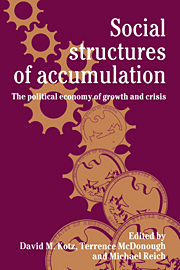Book contents
- Frontmatter
- Contents
- List of contributors
- Introduction
- Part I The theory of social structures of accumulation
- Part II History, institutions, and macroeconomic analysis
- Part III Class, race, and gender
- Part IV The international dimension
- 12 Accumulation and crisis in a small and open economy: the postwar social structure of accumulation in Puerto Rico
- 13 Apartheid and capitalism: social structure of accumulation or contradiction?
- 14 The social structure of accumulation approach and the regulation approach: a US–Japan comparison of the reserve army effect
- 15 The global economy: new edifice or crumbling foundations?
- Afterword: New international institutions and renewed world economic expansion
- Comprehensive bibliography on the SSA approach
- Index
15 - The global economy: new edifice or crumbling foundations?
Published online by Cambridge University Press: 08 October 2009
- Frontmatter
- Contents
- List of contributors
- Introduction
- Part I The theory of social structures of accumulation
- Part II History, institutions, and macroeconomic analysis
- Part III Class, race, and gender
- Part IV The international dimension
- 12 Accumulation and crisis in a small and open economy: the postwar social structure of accumulation in Puerto Rico
- 13 Apartheid and capitalism: social structure of accumulation or contradiction?
- 14 The social structure of accumulation approach and the regulation approach: a US–Japan comparison of the reserve army effect
- 15 The global economy: new edifice or crumbling foundations?
- Afterword: New international institutions and renewed world economic expansion
- Comprehensive bibliography on the SSA approach
- Index
Summary
It is now virtually a commonplace among leftist observers and activists that we have recently witnessed the emergence of a New International Division of Labour (NIDL) and the Globalization of Production (GOP). For many, these twin tendencies manifest such deep structural transformations in the world economy that group or government efforts to swim against the currents are becoming increasingly ineffectual, if not futile. The power of labor, community and the state has seemed to wither as multinational corporations sweep irresistibly around the globe. The roots of these concerns, at least in the advanced capitalist countries, are obvious – manifested, for example, in rising unemployment, sectoral devastation in many traditional industries, and consistent corporate demands for concessions on wages, benefits and working conditions. Intensifying international competition appears to be casting its shadow more and more broadly across the economic landscape, chilling the spirit of growing numbers of organized and unorganized workers alike.
Some of these concerns are clearly warranted, since there have been striking changes in the dynamics of the world economy over the past fifteen years. But many others stem from a transposition of trend and long cycle, confusing the effects of continuing stagnation in the world capitalist economy with the auguries of a transformation of the global capitalist order. It is not always easy to discriminate between the decay of an older order and the inauguration of a new.
- Type
- Chapter
- Information
- Social Structures of AccumulationThe Political Economy of Growth and Crisis, pp. 292 - 306Publisher: Cambridge University PressPrint publication year: 1994
- 15
- Cited by



